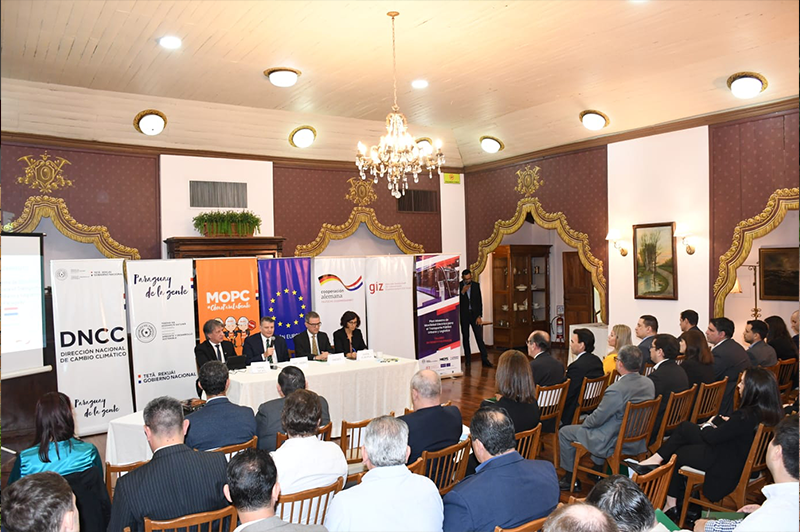This instrument will coordinate entities and actions to promote the energy transition of the transport sector.
Today, the government of Paraguay presented its Electric Mobility Master Plan for Urban Public Transport and Logistics (PMME), an instrument with the potential to become a Latin American reference in electromobility.
This plan responds to the country's commitment to improve the environmental, economic, and social conditions of the population through coordinated actions in the transportation sector.
This initiative is part of the Paraguay Euroclima Action Plan, defined jointly with the Government of Paraguay and the Euroclima program, financed by the European Union, to support the country in meeting its climate commitments through strategic actions. The PMME was developed with the technical implementation of the Deutsche Gesellschaft für Internationale Zusammenarbeit (GIZ) GmbH.
The presentation event was attended by national authorities, such as the Ministry of Environment and Sustainable Development (MADES)(MESD), the Ministry of Public Works and Communications (MOPC)(MPWC) through the Vice Ministry of Transportation (VMT) and the Vice Ministry of Mines and Energy (VMME), and the Ministry of Industry and Commerce; international organizations such as the Delegation of the European Union in Paraguay, GIZ, as well as the business sector and civil society.
PMME Background
The Electric Mobility Master Plan for Urban Public Transport and Logistics (PMME) is the result of a two-year work process that included participatory workshops with the presence of high-level representatives and technical specialists who collaborated in the design, feedback, and validation of the contents.
Likewise, experiences and good practices were exchanged with countries in the region that have made progress in the implementation of electric mobility. As a benchmark country in hydroelectric power generation, Paraguay has great opportunities in the energy transition in the transportation sector.
The third sector with the highest percentage of greenhouse gas (GHG) emissions in Paraguay is energy and transportation, with 16.28% of total emissions, of which 89.01% come from the transportation sector.
The PMME was developed to align with other public policies and climate commitments, such as the Paraguay 2030 National Development Plan and the Nationally Determined Contributions (NDCs). For its implementation, the Electric Mobility Strategic Council (CEME) was formed.
Contents of the PMME

By 2040, Paraguay will be the regional reference in promoting and boosting electric mobility, with a sustainable, circular, and integral model, with 100% of electric vehicles in public transportation systems and 50% of electric vehicles in logistic transportation. This will take advantage of the country's clean energy generation from its hydroelectric power plants to promote truly zero-emission mobility in Paraguay.
Vision of the PMME PY
The plan establishes the general and specific guidelines towards a transition to the electrification of urban public transport and logistics in Paraguay in the short, medium, and long term.
Based on the diagnostics and studies conducted, as well as on the legal, regulatory, and institutional frameworks for electric mobility, a framework of measures, activities and programs has been proposed to advance the implementation of quality, low-emission public transport and logistics.
These actions are structured in the following strategic objectives:
- Institutional Management and Coordination: strengthen inter-institutionality for the transition to electric mobility in Paraguay, establishing a regulatory framework for electric mobility.
- Necessary Conditions for Electric Mobility: to develop the enabling scheme for electric mobility, where investment in electric charging infrastructure is promoted, developing an investment plan for electric charging infrastructure.
- Electric Public Transportation: develop actions to promote electric public transportation.
- Logistic Transport: develop actions to promote electric logistic transport.
Impacts of electric mobility in Paraguay
The PMME contemplates the replacement of 100% of the public transport bus fleet, 50% of cabs and the inclusion of electric bicycles in the five main cities of the country. It also envisages the replacement of 50% of cargo trucks with electric vehicles, 50% of delivery vans, and 100% of delivery motorcycles.
This will reduce GHG emissions and diesel and gasoline consumption. Comparing a Baseline Scenario (BAU) and a Scenario with the implementation of the PMME, the following emission reductions will be achieved:
|
GHG emissions in BAU and PMME scenarios 2022-2040 |
|||
| BAU | PMME | Reducción | |
|
Ton CO2 Eq |
19.060 |
11.110 |
7.960 |
|
Ton CH4 |
2.610 |
1.520 |
1.100 |
|
Ton N2O |
790 |
460 |
330 |
Source: PMME

About Euroclima
Euroclima is a program funded by the European Union and co-financed by the German federal government through the Federal Ministry for Economic Cooperation and Development (BMZ), as well as by the governments of France and Spain through the Ministry of Foreign Affairs, European Union, and Cooperation.
The Program's mission is to reduce the impact of climate change and its effects in 33 countries in Latin America and the Caribbean by promoting mitigation, adaptation, resilience, climate investment and biodiversity. To this end, it is implemented according to the "Spirit of Team Europe" under the synergistic work of seven agencies: Spanish Agency for International Development Cooperation (AECID), AFD Group: Agence Française de Développement (AFD)/ Expertise France (EF), Economic Commission for Latin America and the Caribbean (ECLAC), Ibero-American Foundation for Administration and Public Policy (FIIAPP), Deutsche Gesellschaft für Internationale Zusammenarbeit (GIZ) GmbH, the UN Environment Programme (UNEP) and the United Nations Development Programme (UNDP).
For more information:
This email address is being protected from spambots. You need JavaScript enabled to view it.euroclimaplus.org


